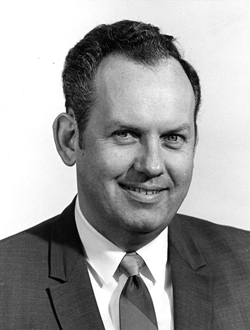Joseph E. Rowe

 Enlarge
Enlarge
Joseph E. Rowe was a leading pioneer in the development of microwave electron tube and solid state device technologies, and filled an ambitious career with leadership positions across academia and industry. In his time with the department, he helped develop one of the premier laboratories on campus, and has since left a lasting mark by endowing, with his wife Anne, a professorship in electrical engineering and computer science.
Rowe was born in Detroit on June 4, 1927. He was the son of an auto worker who emigrated from Cornwall, England, in 1920. Immediately upon graduation from high school, he enlisted in the U.S. Marine Corps and served in active combat in the Pacific theater. When his tour of duty ended in December 1946, Rowe came home to study electrical engineering at the University of Michigan on the G.I. Bill. He completed his BSE in EE and Engineering Math in 1951, his MSE in ’52, and his PhD in ’55.
In the summer of 1950 he married Anne Prine Rowe, who later distinguished herself as a University of Michigan metallurgical engineer (B.S.E., 1950; Ph.D., 1970). The two of them became the first couple to each receive distinguished engineering alumni awards from U-M.
Rowe joined the University of Michigan faculty in 1953. He served as director of the Electron Physics Laboratory from 1958 to 1968, where he managed and developed research programs in microwave electron tube devices, gaseous plasmas, and semiconductors. He was appointed Chair of Electrical and Computer Engineering in 1968 and served in that position until he left the university in 1974. Under his leadership, the Electron Physics Laboratory became one of the premier laboratories on campus and was the forerunner of the Solid-State Electronics Laboratory.
After departing from U-M, Prof. Rowe became Dean of Engineering and then Provost at Case Western Reserve University.
During the 1970’s, in addition to his other activities, Rowe “served as Chairman and CEO of a small technical consulting company which developed and marketed computer applications software for the power systems and microwave systems industries. This small company, called Shared Applications, Inc. was sold to Harris Corporation in 1978.” [Communicator, Annual Publication of the Department of Electrical Engineering and Computer Science, Fall 1992]
In 1980, according to George Haddad, “the Harris Corporation made him an offer he could not refuse – Harris bought Joe’s ‘Shared Applications’ business, which he had started while at Michigan to help in the design of electron tube devices.” [see Tribute] Rowe worked as vice president and chief science at three Fortune 500 companies: Harris Corporation, Gould Corporation, and Pittsburgh Plate Glass (PPG). Finally, he accepted a position as Director of the Dayton Research Institute (after he was supposed to have retired!).
Rowe made significant technical contributions to his field. He was one of the major pioneers in the area of microwave devices and, in particular, vacuum tube devices such as traveling wave tubes and magnetrons. Such components are still in wide use today in many applications, including high-power communication and radar systems as well as microwave ovens. His 1965 book, Nonlinear Electron Wave Interaction Phenomena, is a standard in the field.
Rowe was elected a member of the National Academy of Engineering in 1977 for contributions to the theory and design of high-power microwave electron tubes and solid-state microwave devices. He was an IEEE Fellow, and while at Michigan, he received a University of Michigan Distinguished Faculty Achievement Award. He later received the first CoE Alumni Society Merit Award for EECS in 1992.
Although Rowe officially departed from U-M in 1974, he never really left. He was the first chair of the EECS Advisory Committee when it was established in 1986 and also served on the College of Engineering’s National Advisory Committee. He was Chair of the CoE Annual Fund, and a member of the executive committee of the Design for Impact Campaign. In 2002, he and Anne endowed a professorship in electrical engineering and computer science.
And of the 324 home football games that Michigan played between 1946 and 2000, Rowe attended approximately 300—despite living in Cleveland, Florida, Chicago, Pittsburgh, and Dayton during almost half of those years.
Rowe passed away on October 23, 2002.
 MENU
MENU 
